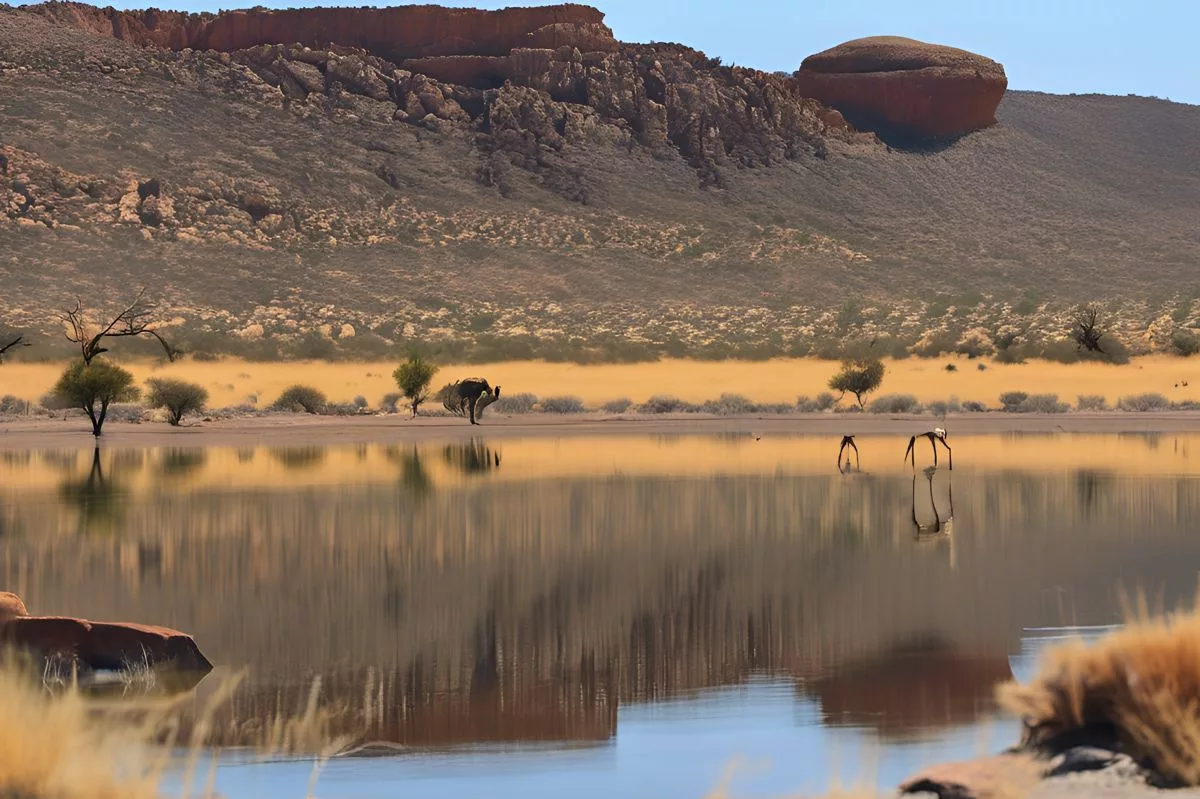The Northern Cape is set to host the 2024 World Tourism Day, showcasing its rich cultural history, natural beauty, and unmatched adventure experiences. The province is also leading South Africa’s astro-tourism pursuits, using its prime location for astronomical observations. The National Astro-Tourism Strategy aims to develop an all-inclusive sector that offers sustainable benefit-sharing opportunities, creating more jobs and driving economic growth. Let’s unite to make tourism a positive force that elevates the quality of life for all South Africans.
What is the 2024 World Tourism Day and where will it be held?
The 2024 World Tourism Day will be held in the Northern Cape, South Africa. This event will showcase the region’s scenic beauty, rich cultural history, and unmatched adventure and cultural experiences. The Northern Cape is also taking the lead in South Africa’s astro-tourism pursuits, utilizing its prime location for astronomical observations.
The Northern Cape, an area celebrated for its breathtaking scenery, rich cultural history, and unmatched adventure and cultural experiences, is set to host the 2024 World Tourism Day festivities. This event showcases this less-explored region, despite its wide variety of attractions designed to appeal to diverse interests and tastes.
A Province of Unmatched Natural Beauty and Astro-Tourism
Minister of Tourism, Patricia de Lille, spoke at the Tourism Month Media Launch, sharing her captivating journey through Riemvasmaak and the Kgalagadi National Park the previous year. These are just two of the multitude of attractions that this province offers. From the rugged beauty of the Kalahari Desert to the colorful wildflower displays of Namaqualand, the Northern Cape is a testament to the natural splendor of the region.
Moreover, the Northern Cape is taking the lead in South Africa’s astro-tourism pursuits, utilizing its prime location for astronomical observations. Near Carnarvon, a small town, lies the South African site (MeerKAT) of the Square Kilometre Array (SKA), the most powerful radio telescope project in the world. This global infrastructure project is set to solidify South Africa’s standing in the arena of astro-tourism.
National Astro-Tourism Strategy: A Vision for Inclusive Growth
The Department of Tourism is putting the finishing touches on the National Astro-Tourism Strategy, setting South Africa apart as the first African country to formulate such a plan. Its vision is to develop an all-inclusive Astro-Tourism sector that offers sustainable benefit-sharing opportunities. Given that half the global population has no clear view of the night sky, South Africa, blessed with some of the clearest and darkest skies, is well-positioned to emerge as a top-tier astro-tourism destination.
South Africa is home to two of the world’s most notable astronomy initiatives, the Square Kilometre Array and SALT (the largest optical telescope in the Southern Hemisphere). The National Astro-Tourism strategic pillars, created through a multidisciplinary consultation process, aim to expand astro-tourism in South Africa through three strategic pillars: Indigenous Celestial Narratives and Human Capacity Development, Infrastructure Development, and Inclusive Tourism Growth and Partnerships.
Tourism: A Driving Force in the Economy and Job Market
In the economic sector, the contribution of tourism to the country’s GDP in the first quarter of 2024 was a remarkable 8.8%, surpassing the contributions of industries such as transport, mining, and agriculture, and came close to matching the government’s GDP contribution. Anticipations of further growth are robust, with the sector’s contribution predicted to escalate to 10.4% of GDP by 2030.
The domestic tourism market saw an impressive 38 million domestic trips in 2023, pumping R121 billion into the economy. This surge underscores the vital role domestic travelers play in sustaining the industry. Domestic tourism is the cornerstone of the tourism sector, and measures are being implemented to make travel more affordable and accessible to all South Africans.
The tourism sector is also significant in job creation, projected to increase from 1.7 million jobs in 2024 to 2.2 million by 2030. The sector’s potential for swift job creation, particularly for unemployed youth and women, surpasses industries like agriculture and mining that require high initial investments and have high entry barriers.
Celebrating Tourism and Peace: Connecting People, Places, and Culture
As Tourism Month 2024 gets underway, it offers a moment to recognize the sector’s contribution to global development, cultural exchange, and human connection. This year’s theme, “Tourism and Peace- 30 years of connecting people, places, and culture”, applauds the unity that arises from diversity. It’s more than just an attempt to attract visitors – it’s an invitation for locals and international guests to discover the experiences and narratives that define South Africa as a nation.
Despite domestic challenges like high living costs and interest rates that have affected local travel, efforts to boost the growth of the tourism sector remain steadfast. Steps are being taken to ensure tourists’ safety and promote the welfare of both local and international tourists.
The Tourism Master Plan is already in motion, serving as a comprehensive roadmap to steer the sustainable growth and competitiveness of the tourism sector. Initiatives such as the R1.2 billion Tourism Equity Fund aim to propel sector transformation and guarantee a more equitable distribution of tourism benefits throughout society.
As the 2024 Tourism Month campaign progresses, let’s unite to make tourism a positive force that elevates the quality of life for all South Africans. Let’s continue exploring our vast, beautiful country, staying true to our theme of “Tourism and Peace- 30 years of connecting people, places, and culture”.
What is the Northern Cape’s leading pursuit in the tourism industry?
The Northern Cape is taking the lead in South Africa’s astro-tourism pursuits, utilizing its prime location for astronomical observations.
What is the National Astro-Tourism Strategy?
The National Astro-Tourism Strategy is a plan created by the Department of Tourism to develop an all-inclusive Astro-Tourism sector that offers sustainable benefit-sharing opportunities. Its goal is to expand astro-tourism in South Africa through three strategic pillars: Indigenous Celestial Narratives and Human Capacity Development, Infrastructure Development, and Inclusive Tourism Growth and Partnerships.
How does tourism contribute to the South African economy?
Tourism contributed 8.8% to the country’s GDP in the first quarter of 2024, surpassing the contributions of industries such as transport, mining, and agriculture. The sector’s contribution is predicted to escalate to 10.4% of GDP by 2030. The tourism sector also has the potential for swift job creation, projected to increase from 1.7 million jobs in 2024 to 2.2 million by 2030.
What is the theme for Tourism Month 2024 and what does it mean?
The theme for Tourism Month 2024 is “Tourism and Peace- 30 years of connecting people, places, and culture”. It applauds the unity that arises from diversity, inviting locals and international guests to discover the experiences and narratives that define South Africa as a nation.
What initiatives are being implemented to make travel more affordable and accessible to all South Africans?
Initiatives are being implemented to make travel more affordable and accessible to all South Africans, as domestic tourism is the cornerstone of the tourism sector. Measures are being taken to ensure tourists’ safety and promote the welfare of both local and international tourists. The R1.2 billion Tourism Equity Fund aims to propel sector transformation and guarantee a more equitable distribution of tourism benefits throughout society.
What is the Tourism Master Plan?
The Tourism Master Plan is a comprehensive roadmap to steer the sustainable growth and competitiveness of the tourism sector. It serves as a guide to ensure that the tourism industry contributes to the country’s economic growth and job creation while also addressing issues related to sustainability, transformation, and inclusivity.












